AUTHOR VISITS
For thirty years, I have been visiting schools, libraries, arts centres, prisons and museums, to encourage reading and writing.
As well as reading out my books, I use riddles, poems, storytelling and songs to get audiences involved. Then I like them to have a go at some writing themselves.
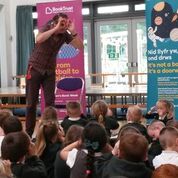
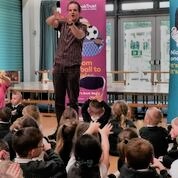
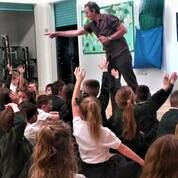
My creative writing teaching features a mix of starting points suitable for all ages. I’ll often get participants writing poetry because poems are short, there’s a freedom about the form, and imaginations can take flight.
Below are some stories of author visits that I have made, and some of the poems and comments that have came out of them…
I was invited to a school in Lewisham, to get a Year 3 class writing imaginatively. We read some poems about people and thought about how the writers managed to bring people to life. Then everyone chose a person from their own life and wrote a poem about them. Roger wrote:
My Dad
When I was walking I stepped on a green, big piece of glass.
I didn’t feel it, but my dad stayed calm.
He screwed up his face as if he was feeling the pain.
Then he took it out, gently.
Tyler wrote:
My Grandad
My granddad in Jamaica
Lives in a white and red house.
He is warm-hearted.
He takes me to the market in the morning.
We buy eggs, flour, oranges and dog food.
When he laughs hard
His eyes start to water.
“The children find poem writing enjoyable and not a chore. I have certainly had my eyes opened to the potential of children in my class, having observed the work that they produced with Sean.”
Carolyn Lunley, teacher, Blue Gate Fields School, London.
As part of a project called “Creative Landscapes” I worked with some excluded teenagers in Newham. They wrote poems, and then teamed up with professional musicians to put their writing to music and stage a performance. The workshops happened right next to London’s old Royal Docks. We talked about the history of ships coming and going. We imagined sending songs off down the river, like the ships. Jason wrote:
I Float My Song
I float my song upon the river
and the ink starts to leak into the water
and turn it as blue as the sky.
Off it spins, off it blows,
off it goes into the lonely far distance.
The strong tide turns
and back it spins and back it blows
and back it comes home.
“I was shy. I didn’t want to read my poem, but I did and it was good.”
Ruma Rahman, Marion Richardson School, London
For over ten years I worked at The Cherry Trees school, for boys with emotional and behavioural difficulties. Each spring I led a two-week-long writing and music project. I would tell the boys a traditional story and get them writing poems based on what they heard and imagined. One year I told the Russian folktale THE FIREBIRD. A young man called Ivan picks up a firebird’s feather and takes it to the palace, thinking the Tsar will be impressed. The Tsar is impressed. But he tells the boy to catch the firebird itself, or he will be executed. As the story progresses, it is Ivan’s faithful horse that helps him solve the challenges he faces. The young writers imagined having a faithful horse of their own. James wrote:
My Horse
My horse is bright white
and my horse has a gold saddle.
My horse has glittery, silvery eyes
And my horse is strong.
My horse has a spotty tail
and it is shiny.
My horse is big, with a strong neck
and when I am in trouble
my horse carries me away.
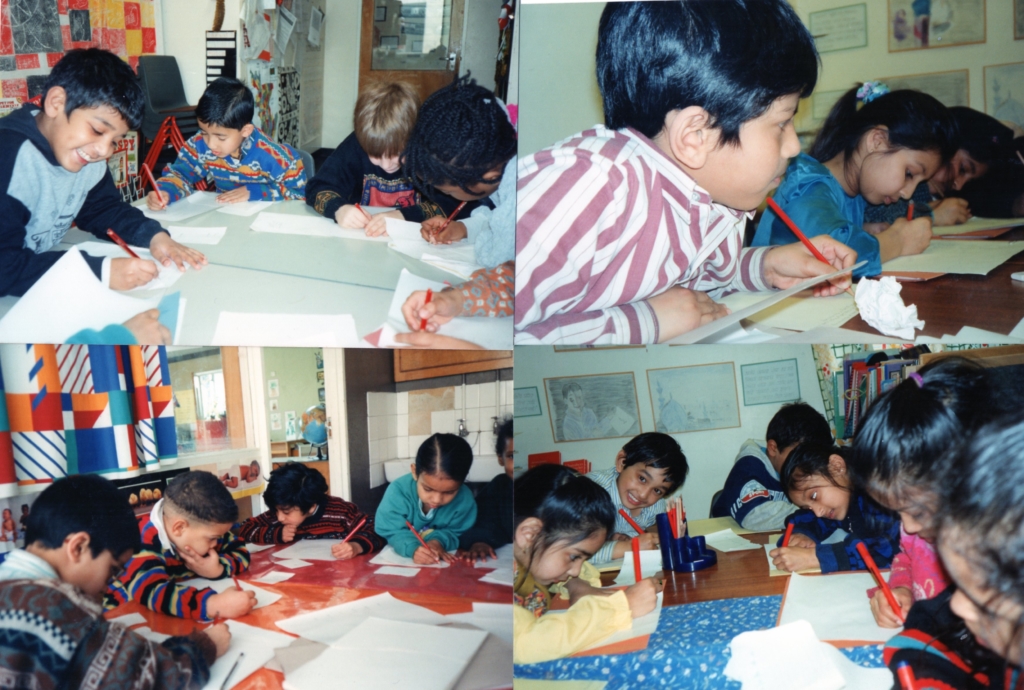
IN 2006, I led a series of poetry workshops for men aged 18-21 at HM Prison Rochester. The residency led up to a poetry performance to other prisoners. The poem below was one of several pieces of writing that came out of the project. It was written collectively by the group of ten young prisoners:
What You Make of It
Glittering shapes.
Distant jewels
spying like eyes.
Bright distant stars.
Silent lamps
wobbling slightly
in themidnight breeze.
Walls listen in the dark.
Am I dreaming
or am I not?
It’s cold, lonely.
Your cell is what you make of it.
“The activities provided me with many useful ideas, particularly as regards helping children express themselves. I now feel more confident as a teacher of poetry.”
Clare Roberts, teacher, Malmesbury School, London.
Thomas Buxton Infants School in Whitechapel was one of the many schools I have worked in for a term or more, as Writer in Residence. In weekly visits to two busy-minded Reception classes, I acted as scribe for their words. It felt like juggling – keeping all their spinning ideas in the air! At the end of the term we published a booklet of forty poems by the children, called “COCKADOODLEDOO”.
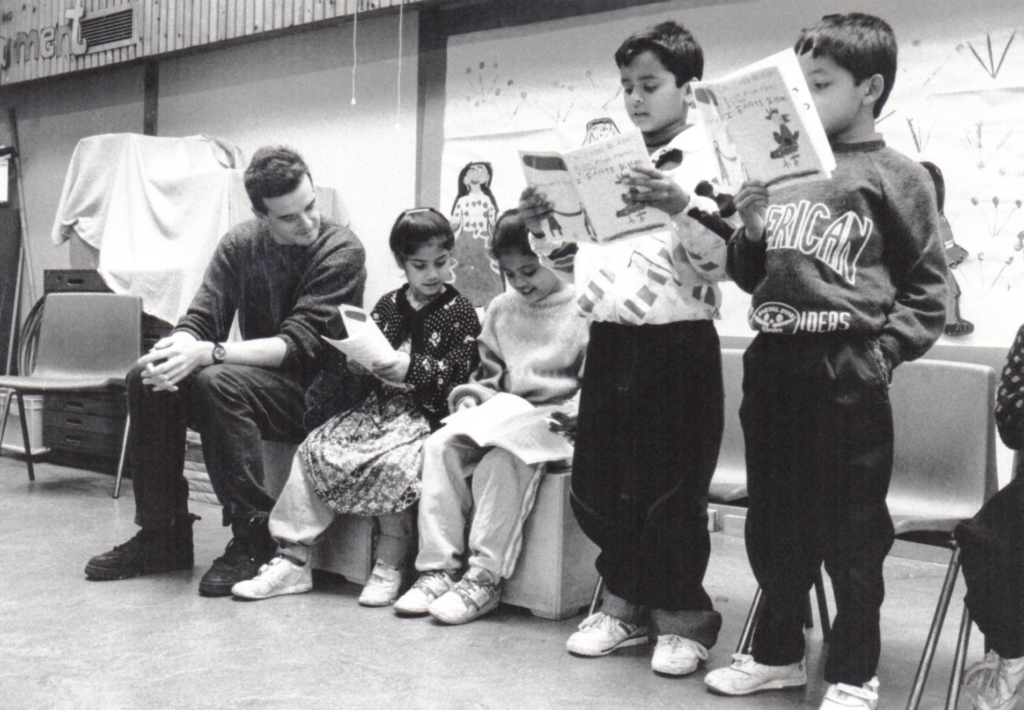
This is one poem from that book, written by Maryam, Abu Arif, Shumon, Asma, Shahela and Akik:
Hopscotch With Words
We can write a poem full of different words.
Short words like
cat,
dog,
was,
car.
Long words like
helicopter,
butterfly,
shortcut,
caterpillar.
Words beginning with “Z” like
zebra,
zip,
zoo,
zap.
Silly words like
boing boing,
goo goo,
teeny weeny,
cuckoo.
Nice words like
Hello.
What’s your name?
My name is Roger.
Do you have any sisters and brothers?
Angry words like
Go out!
You are silly!
I will hit!
Shut up you!
Sad words like
No one is my friend.
My mum hit me.
He cried.
I will miss you so much, goodbye.
We can even make up words like
wohwohwoh
baba-bula
balabalabala
chucka-chuck-chuck
Because we can play hopscotch with words.
We can play hide-and-seek with words.
We can play on-it with words.
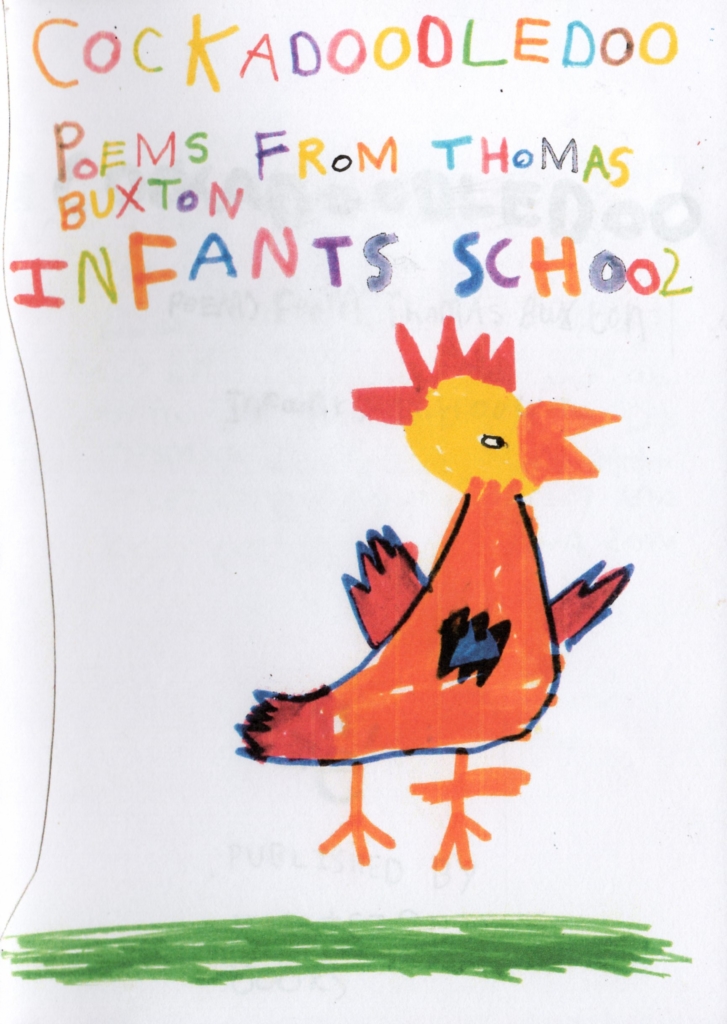
Author visits featuring creative writing build listening and critical skills as well as confidence around putting pen to paper.
I am especially keen on finding ways of sharing the writing that is done. So my workshops usually end with impromptu poetry performances. And longer projects have often resulted in performances or book-making.
I have an ‘Artists Working in Schools’ Certificate issued by the London Arts Board and a recent DBS Certificate.
If you would like to find out more or arrange an author visit please contact me at sean@seantaylorstories.com.
